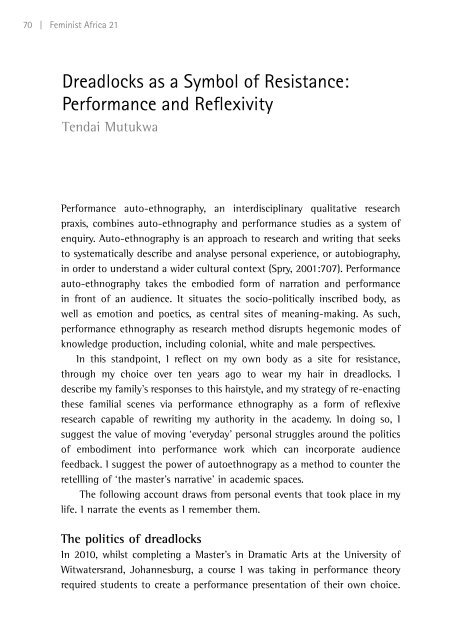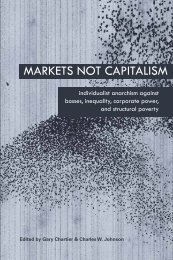The politics of fashion and beauty in Africa
fa21_proof_3
fa21_proof_3
You also want an ePaper? Increase the reach of your titles
YUMPU automatically turns print PDFs into web optimized ePapers that Google loves.
70 | Fem<strong>in</strong>ist <strong>Africa</strong> 21<br />
Dreadlocks as a Symbol <strong>of</strong> Resistance:<br />
Performance <strong>and</strong> Reflexivity<br />
Tendai Mutukwa<br />
Performance auto-ethnography, an <strong>in</strong>terdiscipl<strong>in</strong>ary qualitative research<br />
praxis, comb<strong>in</strong>es auto-ethnography <strong>and</strong> performance studies as a system <strong>of</strong><br />
enquiry. Auto-ethnography is an approach to research <strong>and</strong> writ<strong>in</strong>g that seeks<br />
to systematically describe <strong>and</strong> analyse personal experience, or autobiography,<br />
<strong>in</strong> order to underst<strong>and</strong> a wider cultural context (Spry, 2001:707). Performance<br />
auto-ethnography takes the embodied form <strong>of</strong> narration <strong>and</strong> performance<br />
<strong>in</strong> front <strong>of</strong> an audience. It situates the socio-politically <strong>in</strong>scribed body, as<br />
well as emotion <strong>and</strong> poetics, as central sites <strong>of</strong> mean<strong>in</strong>g-mak<strong>in</strong>g. As such,<br />
performance ethnography as research method disrupts hegemonic modes <strong>of</strong><br />
knowledge production, <strong>in</strong>clud<strong>in</strong>g colonial, white <strong>and</strong> male perspectives.<br />
In this st<strong>and</strong>po<strong>in</strong>t, I reflect on my own body as a site for resistance,<br />
through my choice over ten years ago to wear my hair <strong>in</strong> dreadlocks. I<br />
describe my family’s responses to this hairstyle, <strong>and</strong> my strategy <strong>of</strong> re-enact<strong>in</strong>g<br />
these familial scenes via performance ethnography as a form <strong>of</strong> reflexive<br />
research capable <strong>of</strong> rewrit<strong>in</strong>g my authority <strong>in</strong> the academy. In do<strong>in</strong>g so, I<br />
suggest the value <strong>of</strong> mov<strong>in</strong>g ‘everyday’ personal struggles around the <strong>politics</strong><br />
<strong>of</strong> embodiment <strong>in</strong>to performance work which can <strong>in</strong>corporate audience<br />
feedback. I suggest the power <strong>of</strong> autoethnograpy as a method to counter the<br />
retelll<strong>in</strong>g <strong>of</strong> ‘the master’s narrative’ <strong>in</strong> academic spaces.<br />
<strong>The</strong> follow<strong>in</strong>g account draws from personal events that took place <strong>in</strong> my<br />
life. I narrate the events as I remember them.<br />
<strong>The</strong> <strong>politics</strong> <strong>of</strong> dreadlocks<br />
In 2010, whilst complet<strong>in</strong>g a Master’s <strong>in</strong> Dramatic Arts at the University <strong>of</strong><br />
Witwatersr<strong>and</strong>, Johannesburg, a course I was tak<strong>in</strong>g <strong>in</strong> performance theory<br />
required students to create a performance presentation <strong>of</strong> their own choice.



